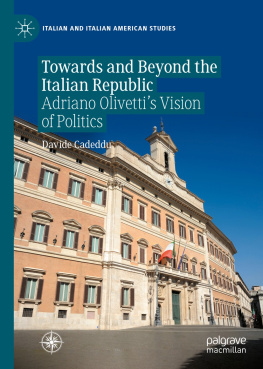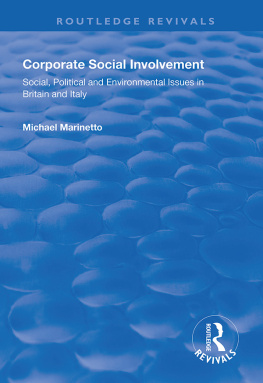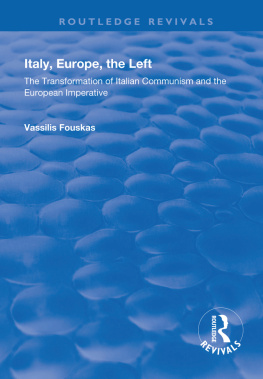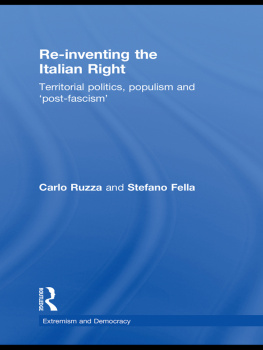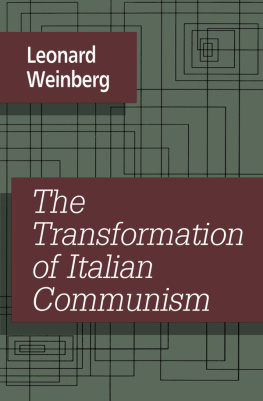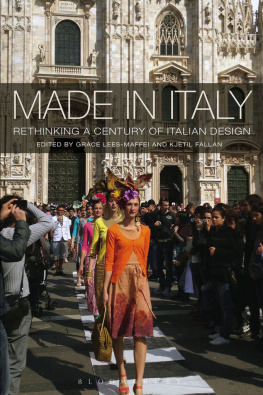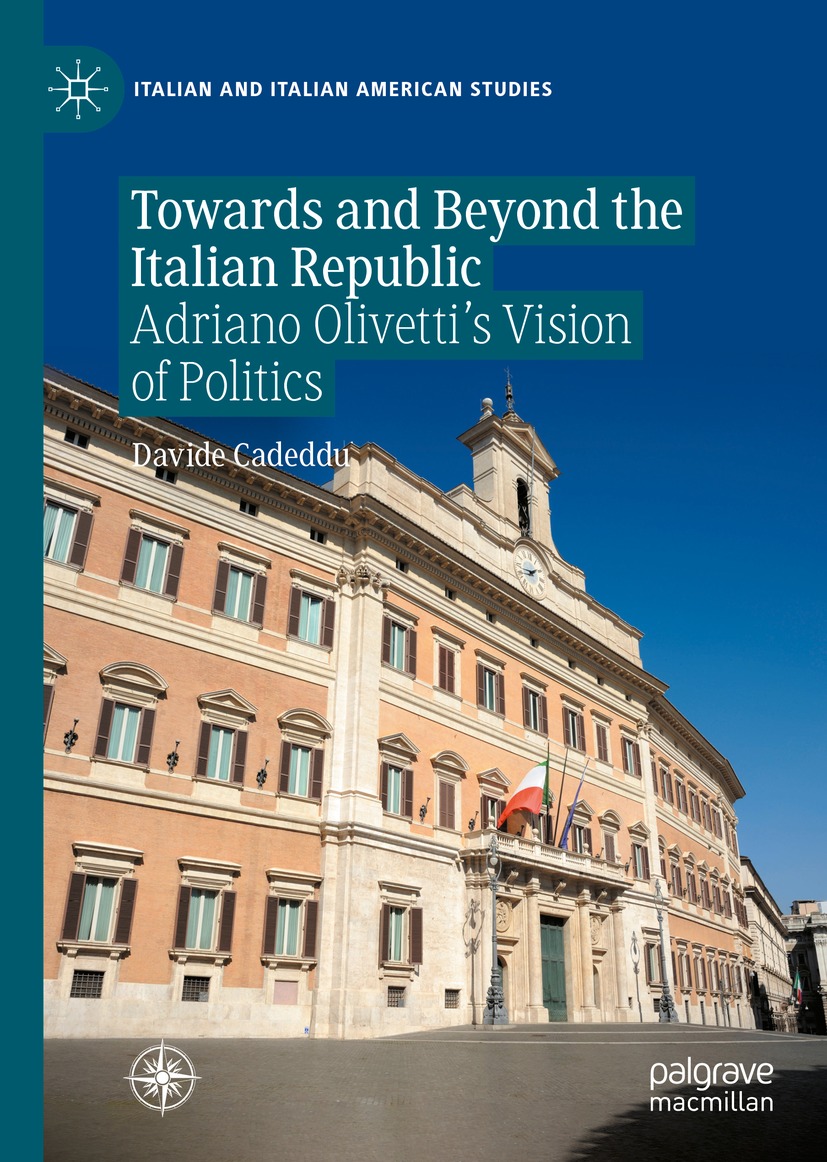Italian and Italian American Studies
Series Editor
Stanislao G. Pugliese
Hofstra University, Hempstead, NY, USA
This series brings the latest scholarship in Italian and Italian American history, literature, cinema, and cultural studies to a large audience of specialists, general readers, and students. Featuring works on modern Italy (Renaissance to the present) and Italian American culture and society by established scholars as well as new voices, it has been a longstanding force in shaping the evolving fields of Italian and Italian American Studies by re-emphasizing their connection to one another.
Editorial Board
Rebecca West, University of Chicago, USA
Josephine Gattuso Hendin, New York University, USA
Fred Gardaph, Queens College, CUNY, USA
Phillip V. Cannistraro, Queens College and the Graduate School, CUNY, USA
Alessandro Portelli, Universit di Roma La Sapienza, Italy
William J. Connell, Seton Hall University, USA
More information about this series at http://www.palgrave.com/gp/series/14835
Davide Cadeddu
Towards and Beyond the Italian Republic
Adriano Olivettis Vision of Politics
1st ed. 2021

Logo of the publisher
Davide Cadeddu
Department of Historical Studies, University of Milan, Milano, Milano, Italy
ISSN 2635-2931 e-ISSN 2635-294X
Italian and Italian American Studies
ISBN 978-3-030-76138-7 e-ISBN 978-3-030-76139-4
https://doi.org/10.1007/978-3-030-76139-4
The Editor(s) (if applicable) and The Author(s), under exclusive license to Springer Nature Switzerland AG 2021
This work is subject to copyright. All rights are solely and exclusively licensed by the Publisher, whether the whole or part of the material is concerned, specifically the rights of translation, reprinting, reuse of illustrations, recitation, broadcasting, reproduction on microfilms or in any other physical way, and transmission or information storage and retrieval, electronic adaptation, computer software, or by similar or dissimilar methodology now known or hereafter developed.
The use of general descriptive names, registered names, trademarks, service marks, etc. in this publication does not imply, even in the absence of a specific statement, that such names are exempt from the relevant protective laws and regulations and therefore free for general use.
The publisher, the authors and the editors are safe to assume that the advice and information in this book are believed to be true and accurate at the date of publication. Neither the publisher nor the authors or the editors give a warranty, expressed or implied, with respect to the material contained herein or for any errors or omissions that may have been made. The publisher remains neutral with regard to jurisdictional claims in published maps and institutional affiliations.
Cover illustration: Vito Arcomano / Alamy Stock Photo
This Palgrave Macmillan imprint is published by the registered company Springer Nature Switzerland AG
The registered company address is: Gewerbestrasse 11, 6330 Cham, Switzerland
This book is dedicated to my parents
Mario Cadeddu and Tina Secchi
hopeful lovers of freedom
Acknowledgements
This work is the result of many years of study, during which I met several scholars. Among all of them, I particularly wish to thank Professor Emeritus Ettore Rotelli (Alma Mater StudiorumUniversit di Bologna), Scientific Director of the Istituto per la scienza dellamministrazione pubblica (Institute for the Science of Public Administration). He taught me the meaning of autonomy and the principles of critical method, through our almost daily dialogue from 2003 until 2019, when the institute was closed because of blind political will.
The manuscript was translated into English by Federica Tampoia Vezzi.
Book Notes
This study is about the historical process that led to the establishing of the Italian Republic (1946) and its Constitution (1948), through the experience and the political reflections of Adriano Olivetti (19011960), general manager and then president of the famous typewriter factory Olivetti. After the publication of the first articles by Olivetti during the two-year period of 19191920 in the weekly LAzione Riformista, his engineering studies at the Politecnico di Torino did not leave him much time to dedicate to journalism and, with the advent of fascism, his writing activities were finally shelved. From his personal experience as production organizer and head of industry, his own reflections evolved: first on the scientific organization of a modern company, then on that having to do with the surrounding territory and on the direct and indirect interests that its activities seemed to touch. An unbroken line of reasoning linked his maturing political reflections during the two post-war periods. Spanning a period of about 20 years, from his joining the Lega democratica per il rinnovamento della politica nazionale (Democratic League for the Renewal of National Politics) in 1919, formed around LUnit by Gaetano Salvemini, many historical experiences and theoretical influences followed, enriched his awareness, and yielded complex answers in face of the same problem: the crisis of representative democracy. The historical context of the 1950s did not prove to be very propitious but the guidelines dispersed throughout the Italian cultural and political world from the movement that Olivetti founded were certainly seminalgenerating a legacy of ideas that has only in part been recognized.
What makes this study distinctive is the original approach to read the history of Italy through Olivettis eyes and thoughts. There is nothing comparable in English studies about Italian history, also because Olivettis political thought is particular, far from the more common Christian democratic or Communist perspective of those years. It is simply another view of what the Italian Republic could be and was not.
Contents
About the Author
Davide Cadeddu
(PhD, 2004) is Associate Professor of History of Political Theory at the University of Milan. Executive editor of Glocalism: Journal of Culture, Politics and Innovation, he is also scientific coordinator of the association Globus et Locus (Italy), member of the editorial board of the journal Il pensiero politico. Rivista di storia delle idee politiche e sociali, and editor of the series Biblioteca di cultura politica europea (Rubbettino, Italy) and Filologia e politica (Giappichelli, Italy). He writes occasionally for some national newspapers and above all for HuffPost (Italian edition), where he has his own blog. He is director of the Seminario permanente sui classici del pensiero politico at Fondazione Giangiacomo Feltrinelli (Italy). He mainly deals with the history of twentieth-century political theory, focusing on federalism, elitism, and the relationship between culture and politics. Among his recent publications are John Dunn and the History of Political Theory, in History of European Ideas, vol. 47, 1, 2021; (ed.) A Companion to Antonio Gramsci: Essays on History and Theories of History, Politics and Historiography

